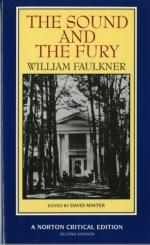|
This section contains 1,822 words (approx. 7 pages at 300 words per page) |

|
Although Faulkner never thought of his work as political in the usual sense … early in his career he commenced a determined struggle against dehumanization in his social milieu (soulless technology and commercialism, the alienation of human powers and identity) and, more importantly, in the literary milieu itself. By the time he wrote The Sound and the Fury he had experimented with versions of at least three of those dominant aesthetic modes of his time which were, according to [George] Lukács, the modernist options. Unlike most of his contemporaries, Faulkner had sensed the denial of human and artistic potential latent in those modes and, at least in his essential method, rejected them. The three modes may be roughly characterized as positivism (detached observation, a transparent medium); art for art's sake (literary solipsism, an opaque medium); and primitivism (deference to states of existence unrealizable in art and unavailable to...
|
This section contains 1,822 words (approx. 7 pages at 300 words per page) |

|


